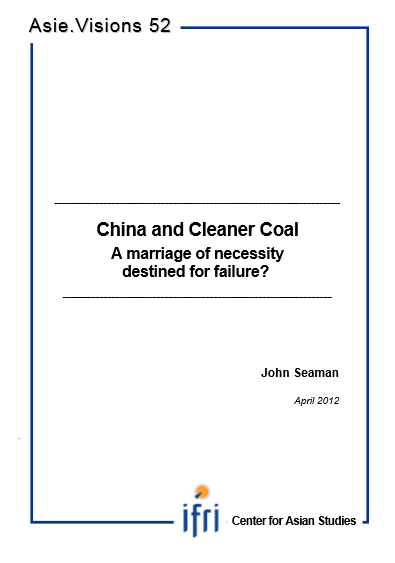China and Cleaner Coal: A marriage of necessity destined for failure?

For China, coal is a crucial source of abundant, indigenous and affordable energy and is a pillar of economic and social stability. From a logic of energy security, and because the industry itself maintains a formidable political presence through the sheer fact of its history and size, this resource will continue to play a central role in the country’s energy mix. But in order to respond to the growing need to reduce the burden of coal use on the environment and the Chinese population, and to prevent catastrophic climate change, both Chinese leaders and the industry itself have faced a certain reality - coal must become cleaner.
This has led to a tenuous compromise between those in China advocating for the use of coal as a matter of economic necessity and social stability (security of supply, reliable and cheap electricity, and indigenous energy technologies) and those who strive for more environmentally sustainable growth (and thus emphasize “clean” coal). The convergence of these two concepts has spurred a major shift towards newer, more efficient, though still highly polluting technologies - notably larger scale, hotter burning supercritical and ultra-supercritical coal-fired plants. But it has also spawned a number of demonstration-scale projects in various cutting-edge technologies to include coal gasification and carbon capture and storage (CCS), which promise vast improvements in CO2 and other, toxic emissions if widely adopted. Indeed, mitigating climate change while continuing to rely heavily on coal will only be possible if carbon can successfully be captured and stored on a broad scale.
The push to develop new coal technologies opens doors for both foreign and Chinese businesses to work together, potentially creating new market opportunities at home and abroad. Chinese companies can receive much-needed capital and expertise, while foreign companies and researchers are given the chance to test and develop technologies at a level of speed and scale that is not possible on their own domestic markets. This cooperation has also had clear benefits on a political level, particularly between China and the United States. Indeed, it has proven a useful diplomatic tool and a meaningful cushion in an otherwise rocky bilateral relationship. But if and when the time comes to access third markets, the culture of cooperation around advanced coal may quickly turn into a cutthroat race for market access.
But before this stage can be reached, a number of very high hurdles remain. Implementing and maintaining these technologies is expensive and requires vast amounts of additional energy in order to make them truly cleaner in respect to emissions. Responding to the price challenge is particularly tricky. It means successfully reducing the cost of advanced technology and reforming China’s power pricing structure to internalize the real cost of coal on society. This must somehow happen without tipping the balance of affordable energy needed to power the country’s economic development. Moreover, in regards to CCS in particular, progress must also be made in reducing the energy demand. Current technologies require an input of 20-30% more energy to capture and store carbon. In China, this could translate into an untenable increase in coal demand, likely pushing an already overburdened industry well beyond the breaking point. And yet another formidable hurdle risks negating any progress made in developing cleaner coal technologies: water scarcity. The coal industry is China’s largest industrial water user - demanding 34 billion m3 in current times - and is also concentrated in the nation’s driest regions. But a lack of adequate consideration of the relationship between coal and water in policy planning holds grave risks for the future.
Ultimately, while coal will continue to play an important role in China’s economy, the challenges to making it truly cleaner are formidable. A certain reality must be granted to the need for cleaner coal in China today, but substantial pressure should be put on a phasing down, if not a phasing out of coal in China’s future energy mix.

Available in:
Regions and themes
ISBN / ISSN
Share
Download the full analysis
This page contains only a summary of our work. If you would like to have access to all the information from our research on the subject, you can download the full version in PDF format.
China and Cleaner Coal: A marriage of necessity destined for failure?
Related centers and programs
Discover our other research centers and programsFind out more
Discover all our analyses
China’s Strategy Toward Pacific Island countries: Countering Taiwan and Western Influence
Over the past decade, China has deployed a diplomatic strategy toward the Pacific Island Countries (PICs). This strategy pursues two main objectives: countering Taiwan's diplomatic influence in the region and countering the influence of liberal democracies in what Beijing refers to as the "Global South."

Opening up the G7 to South Korea to Address Contemporary Global Challenges
The G7’s global influence has diminished as powers like China reshape international governance through initiatives such as BRICS and the Shanghai Cooperation Organisation (SCO). With the G7 now representing just 10 per cent of the world’s population and 28 per cent of global GDP, its relevance is increasingly questioned.
Expanding SPDMM as a pivotal institution in the Pacific – A French perspective
The South Pacific Defence Ministers’ Meeting (SPDMM) is the only forum that brings together defense ministers from the wider South Pacific — including Chile, which is hosting it for the first time. This heterogeneous group of countries with varying resources, capacities, and interests — Australia, Chile, Fiji, France, New Zealand, Papua New Guinea (PNG), and Tonga — are united by their shared determination to strengthen cooperation on maritime security and humanitarian assistance and disaster relief (HADR) activities.
EU’s Derisking From China: A Daunting Task
With economic security as a major concern, the EU has recently turned to “derisking” from China. The EU strategy entails reducing critical dependencies and vulnerabilities, including in EU supply chains, and diversifying where necessary, while recognizing the importance and need to maintain open channels of communication.










